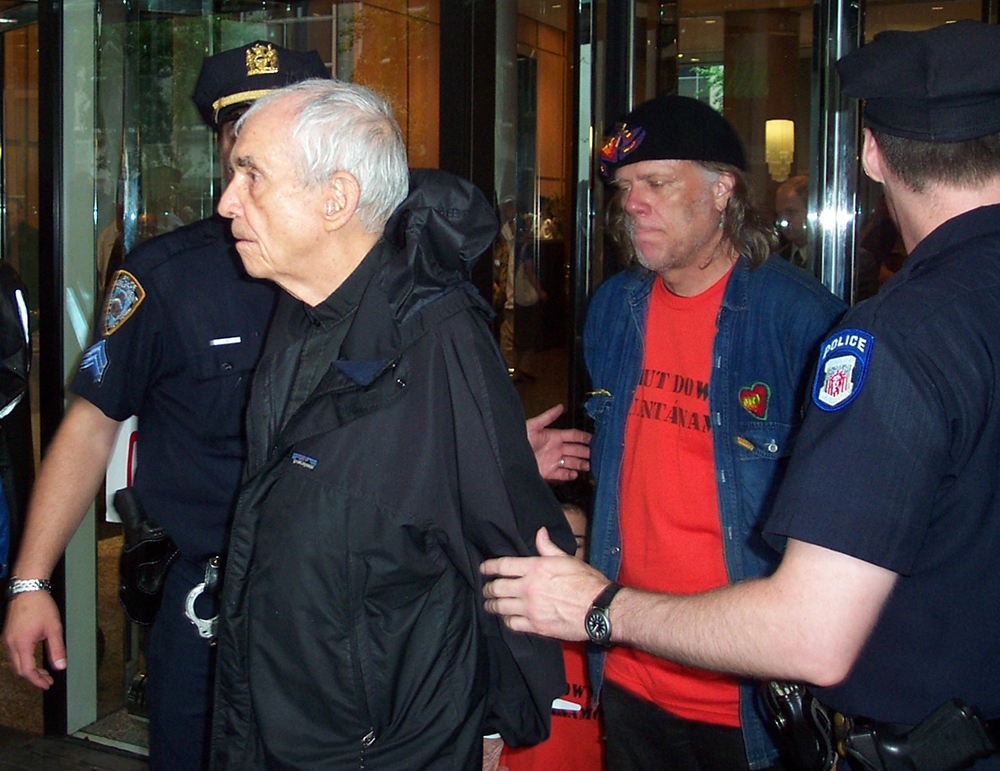Daniel Berrigan — Jesuit priest, poet, teacher and prominent anti-war activist — passed away on April 30, 2016 at the age of 94. The death of the cognizant and humble peacemaker inspired a generation of activists and his legacy has reminded us of the cost of discipleship and the importance of nonviolent resistance. Berrigan was the voice of opposition against the Vietnam War and some belonging to the Catholic left have claimed the priest was the closest thing society has to a modern day prophet.
refusing to be silent
Dietrich Bonhoeffer once declared “Silence in the face of evil is itself evil: God will not hold us guiltless.” Berrigan refused to be silent and paid the heavy price of exile and incarceration. The priest founded the anti-nuclear Plowshares Movement, founded Clergy and Laity Concerned about Vietnam with Rabbi Abraham Heschel, traveled to North Vietnam on a peace mission with the historian Howard Zinn and was a member of the legendary Catonsville Nine.
Berrigan often used nonviolent protest and civil disobedience to stand against oppressive power structures and expose the immorality of the Vietnam war. The priest once burned 378 draft files with his brother Phil and several other clergy members in resistance of the Vietnam war in 1968. The group became famously dubbed the Catonsville Nine for entering the draft office bearing the same name and burning the documents with homemade napalm. Berrigan’s name would later be placed on the F.B.I.’s most wanted list and he would serve 18 months in federal prison for destroying government property. His death would coincide with the 40th anniversary of the Fall of Saigon and the end of a war that took the lives of 58,000 U.S. military servicemen and 2 million Vietnamese.
gainst religious leaders
The priest did not stop there. On Sept. 9, 1980, Berrigan, his brother Phil and six other friends entered the General Electric nuclear missile plant in King of Prussia, Pa. and damaged MK12A nuclear warhead cones and poured blood onto the missiles and documents. The Plowshare Movement was named after a passage in the book of Isaiah, where it states swords should be beaten into plowshares.
The Catholic church did not always agree with Berrigan and the priest was ordered to leave the country for a church in Latin America. Berrigan did what the novelist James Baldwin said when he once declared he left the pulpit to preach the Gospel. Like Bonhoeffer, Berrigan went against religious leaders who often colluded with the political elites. The former denounced the pro-Nazi Christian church during the 1930s and the latter broke away from those who refused to call out racial segregation and the Vietnam war.
pursuit of truth and justice
The American priest and his friends have committed their body, soul and mind to stand with the oppressed or those who the Jesuit priest Ignacio Ellacuria once called “the crucified people of history.” Civil disobedience committed in the pursuit of truth and justice nourishes the soul of democracy and shakes the foundation of institutions. We are called to bear the burden of the cross and resist structures of power and domination — not out of hate, but of righteous indignation and a deep understanding that God exempts none from his unconditional love.







